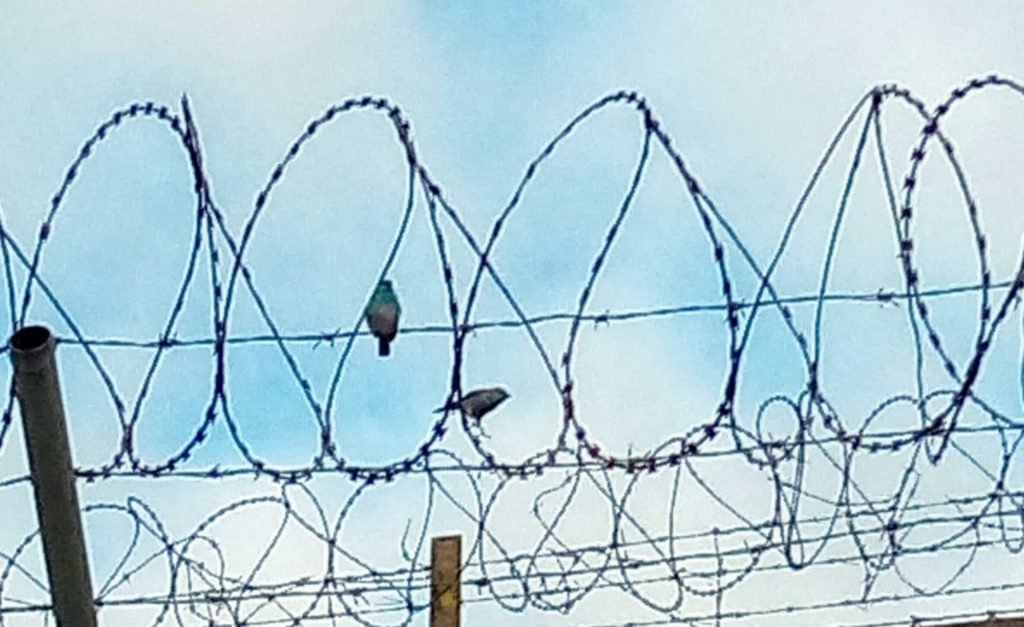
Steve McInnis
We had a typical trip to the prison this week. But, it started with a photo of a couple of little birds cooing on the razor wire. I used my cell phone, so the picture quality isn’t too good. For the last week or so, we wait in our truck until our escort, a guard at the prison named Prince, arrives to take us to the reformatory school. Before, we simply walked up to the gate and asked the various guards we encountered if it was okay to proceed and, not knowing any better, they sent us on. Prince is becoming a good friend. We went to his church on Sunday, where we ended up sitting on the platform, facing the congregation, along with other dignitaries. I don’t know if this will continue if we choose to attend there more regularly. There were only three choirs that morning singing two songs each, so nothing unusual.
Our trip through the prison involves entering the first gate and crossing through a vehicle compound. We are almost always greeted with a “good morning” and “how are you”, to which the answer is “fine and how are you?” Sometimes we are challenged with these same greetings in Chichewa, but most have learned that we are a lost cause. Sometimes there are inmates in this outer compound, waiting to go out on a work detail. They carry out garbage, cut grass and tend some maize fields in the immediate area of the prison. The inmates can also be washing the prison vehicles. There is a decrepit sports car in this area that has no purpose I can see.
Once we cross this compound, we go through the visitors’ waiting area. There are often 20 and as many as 30 people anxiously awaiting their turn to see their friend or family member. Especially with Prince, we immediately go through the next gates into the prison itself. More greetings and everyone, both guards and prisoners, seem happy to see us. Today we are supposed to meet with the officer in charge, but we have been scheduled to meet him on a few occasions already and it has yet to happen. I wonder if he exists. It is here that we walk by his office, door closed.
Through another gate and we enter the reformatory school. We are expected at 830 am and typically we are a few minutes early. Once again, we are greeted with standard greetings. Prince and one of the inmate teachers often give us another couple of Chichewa sentences to learn. Last time it was “kwanu muli bwanji?,” reply: “kwatu kuti bwino.” Or “How is your home?” and “Home is fine.” Home is where we are staying in Malawi, not Woodstock, Ontario. We review this and “ukupita kuti?”, “where are you going?”, which I can understand if you say it with a strong enough Canadian accent.
We surrender our cell phones to Prince, who returns them when we leave. He told me once that if someone stole his 5,000 kwatcha cell phone, they could end up in this prison for 2 years. Nora and I carry smart phones that we paid the equivalent of 50,000 to 100,000 kwatcha apiece. If the judge prorates sentences based on the selling price of the item stolen, the term for stealing our phones is frightening.
From our arrival until 1130, we wait in the library for our chance to teach. There are about 30 teachers in the school, Nora and I the only Canadians. Of the thirty, about half are government-qualified. Nora and I and one Malawian teacher are the only outsiders. The inmates spend little time in the library where we await instructions. They dash in to get chalk and then head to their classes. When the time comes for us to teach, the headmaster comes to us and asks if we are ready, and then ushers us to the assigned class. Meanwhile, I read novels from the library. I’ve read a Ngaio Marsh, an Anne Tyler, and I’ve started a Susan Isaacs. So far, I haven’t read the 1970 tax code or the Scarsdale Diet, nor Sponge Bob, but there is lots of variety.
I don’t ask what anyone was found guilty of to end up in prison: teacher, student or head master. I remember school being enough of a prison without the walls and the barbed wire. One of the teachers, he teaches Macbeth with Nora, is always bright and cheery and his English is excellent. He is awaiting a ruling on his appeal. Its been a few weeks now and the news today is he needs to wait another two weeks for a decision. During our three hours at the prison, Nora and I each get at least one class to teach. Today, I am handed the Form 2 mathematics text and told to teach whatever I am comfortable with. In this case, the one and only student is pretty weak, so I review some basic algebra with him. While he is working on a problem, I notice a couple of young white women go into the primary school. Various inmates take note also and then go about their business. White people look funny here in Malawi, I can understand that they attract a little attention. In Bangladesh, Nora and I could attract and hold the attention of entire villages without breaking into song or magic acts. Here in the prison and elsewhere in Africa, everyone has something better to do and the great white novelty quickly passes. After my class, I meet the two women. They are studying primary education in Switzerland. They are staying in Zomba, so we are unlikely to see them again. One of the guards talks with them about the prison school and mentions that he hopes Nora and I stay longer than the planned November leave date. I guess if world travel is cancelled due to the Corona virus, perhaps we will. We are enjoying every minute, but we will need to go home.
By ten am, we learn that the meeting with the officer in charge has been cancelled. We will meet with him on Friday instead. Prince tells us that we should not be worried about meeting with him, he just wants to talk with us and make contact. He is obviously a busy man and we will want to make a good impression.
It’s soon 11 am and Nora is teaching her last class, while I talk with Prince and the head master. The rain starts and although it’s heavy, the gentle sound of the rain is pleasant to the ear. It’s not a deluge like it was a couple of weeks ago, but we will wait for it to let up before making our way back to our truck. Nora ends her class and joins us in the library. She changes the mood by telling us that the sound of the rain on the corrugated steel roof of her classroom made it impossible to make herself understood. We all had a good laugh at Nora’s expense. And then, her sandal broke so we will need to go shopping. Nora will limp all the way through the prison to the truck and then through the shopping mall to the Bata store, to find a good pair of sandals.
So ended our morning.


